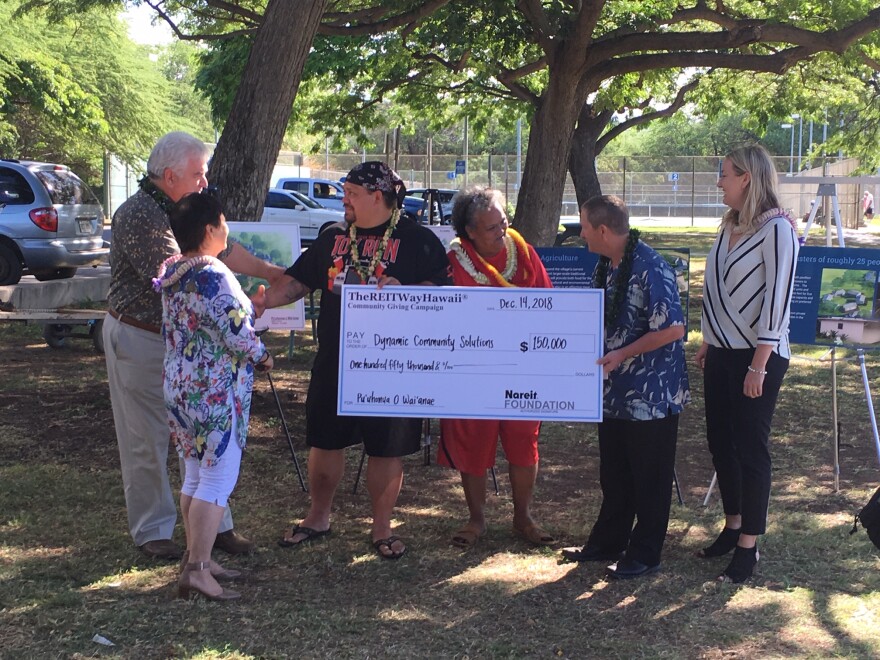A homeless community on Oahu’s leeward coast is one step closer to finding homes. The group received a $150,000 donation to help fund a plan to transition the residents of Pu'uhonua o Waianae to permanent housing. The money came from some of the biggest real estate trusts in Hawaii.
A stand of keawe trees on the grounds of Waianae Boat Harbor has become the semi-permanent home for more than 200 people. Around 50 are children. They live in tents and improvised shelters, pushed out to the fringes by Oahu’s sky-high housing market. The community is formally known as Pu’uhonua o Waianae. But its residents just call it The Village.
The leader of the village is a woman by the name of Twinkle Borge. She is the community’s chief organizer and public advocate. Part grandmother, part mayor.

The village has been here for more than 10 years, always in a state of uncertainty. Twinkle enacted a set of community standards for village residents. Her goal was to minimize the village’s presence and avoid being kicked out of the harbor.
But in March state officials announced they would begin the process of clearing out the camp from the state-owned land. Complaints from harbor users and accusations of theft from a nearby school spurred the action. Individuals present at donation ceremony also intimated that a water bill from the harbor approaching $50,000 in one month contributed.
Twinkle had already been thinking about a more permanent solution for the village before the state’s sweep was announced. But now she knew quick action was needed. She appealed to Governor David Ige, who agreed to a meeting. There, Twinkle presented the Governor with a plan that she had been working on for the past years. Her collaborator in that plan was James Pakele. He has a house in Waianae but frequently volunteers and advocates on behalf of the village.

The plan that Twinkle and James had originally sketched on a napkin was to relocate the village to privately owned land, complete with permanent infrastructure. They presented the plan to Governor Ige, who agreed to temporarily allow the village to remain in place.
Pu'uhonua Waianae created a non-profit foundation to raise money and oversee the project. They called it Dynamic Community Solutions. James was named President. DCS started a crowdfunding campaign and sought out donors, but progress was stubbornly slow. That all changed about a month ago.
A group of Hawaii’s largest commercial real estate owners announced a 3-year campaign focused on affordable housing. The group represents some of the most valuable properties in the state, including the Ala Moana Shopping Center, the International Marketplace, and several big-name hotels.
The group calls itself REITway Hawaii, short for Real Estate Investment Trust. REITway Hawaii has pledged to contribute almost half a million dollars over three years. Pu’uhonua Waianae was selected for a $150,000 donation. DCS also secured a matching challenge for any money they raise, meaning that 150,000-dollar donation became 300,000. Still a ways to go from their goal of $1.5 million.

In the meantime, the immediate challenges of living in Puuhonua Waianae continue. James is currently focused on getting dumpsters and portable toilets for the camp. So far he has been foiled due to the village's lack of general liability insurance.
The possibility has been raised that the state could step in and provide some portion of the remaining $800,000. Senator Maile Shimabukuro represents the area in Hawaii's state senate said that is not beyond the realm of possibility. In the 2018 legislative session, Hawaii lawmakers approved $30 million towards the creation of "Ohana Zones" where homeless individuals and families could establsih temporary living spaces.
In the meantime, residents of the village will contiue living as they have: in a constant state of uncertainty with hope for a better future.



